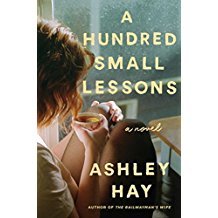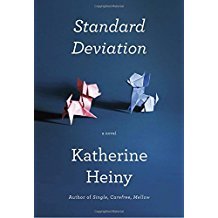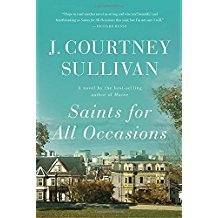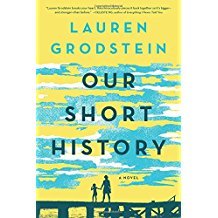My Best Reads of 2017
I’ve never done my own Best Reads list, but I thought I’d compile one for 2017 since this year I set a personal reading record of 59 books (I’m still hoping to hit 60...). Among these, there were standouts and snoozers, some I relished and others I read through to the end because I’m one of those people who can’t abandon a book halfway through. I review a lot of books, which is how I hear about many new releases, but I’ve also started discovering new writers through Instagram and bookish online communities--which mitigates my general dislike of social media. Book discoveries--especially when they’re exceptional--are always cause for celebration.Another cause for celebration: the digital version of Each Vagabond by Name is available right now for 99¢, for a limited time--this is the perfect chance to add to a friend’s TBR list (or your own!) for the new year.Margo’s Top 10 Reads of 2017(In No Particular Order)Anything Is PossibleElizabeth Strout In the rural town of Amgash, Illinois, many people are poor, and some are poorer. As children, Abel and Dottie Blaine dig for food in dumpsters. The Barton kids are subject to ridicule at school for their poverty and their father’s eccentricities. The Nicely sisters, called--meanly--the Pretty Nicely Girls, see their world fall apart when their mother’s sordid affair is discovered. Across Amgash and in nearby towns, men and women find that childhood wounds fester instead of heal--even decades later. Though it’s possible to change, the children they once were live on. Even for Lucy Barton, who leaves town and becomes a successful writer, escaping Amgash does not bring solace.Though this book is closely connected to Strout’s previous novel, My Name Is Lucy Barton, it isn’t a sequel--instead, it’s an augmentation and a reframing, sparking a new understanding of the previous work. The books work in tandem, shedding light on each other, and the experience of reading either is heightened immeasurably by reading the other. Readers may well find themselves in an endless loop of reading and rereading: the depth of these characters and their stories is immeasurable. This is a book that will remind readers why they read. An exquisite work. The Atlas of Forgotten PlacesJenny D. Williams
In the rural town of Amgash, Illinois, many people are poor, and some are poorer. As children, Abel and Dottie Blaine dig for food in dumpsters. The Barton kids are subject to ridicule at school for their poverty and their father’s eccentricities. The Nicely sisters, called--meanly--the Pretty Nicely Girls, see their world fall apart when their mother’s sordid affair is discovered. Across Amgash and in nearby towns, men and women find that childhood wounds fester instead of heal--even decades later. Though it’s possible to change, the children they once were live on. Even for Lucy Barton, who leaves town and becomes a successful writer, escaping Amgash does not bring solace.Though this book is closely connected to Strout’s previous novel, My Name Is Lucy Barton, it isn’t a sequel--instead, it’s an augmentation and a reframing, sparking a new understanding of the previous work. The books work in tandem, shedding light on each other, and the experience of reading either is heightened immeasurably by reading the other. Readers may well find themselves in an endless loop of reading and rereading: the depth of these characters and their stories is immeasurable. This is a book that will remind readers why they read. An exquisite work. The Atlas of Forgotten PlacesJenny D. Williams When Sabine’s niece, Lily, goes missing after a stint as an aid worker in Uganda, Lily’s stepfather begs Sabine for help. Sabine spent almost two decades in Africa, and she knows she must fly to Uganda if she has any chance of helping Lily. Official channels prove to be of little help, but Sabine finds the support she needs in Christoph, a Swiss academic, and his assistant, Rose, a local woman who is frantic to find her boyfriend, Ocen. As Sabine and Rose uncover the extent of Lily and Ocen’s involvement, they realize their loved ones are in more danger than they could ever have imagined. Moving deep into lawless territory in Congo, where the brutal Lord’s Resistance Army is a constant threat, Rose must face the worst horrors from her past in order to save the ones she loves most.This stunning novel is, first and foremost, a true page turner--expertly plotted, with riveting storylines for both Rose and Sabine. Williams knows well the world of her story, and reading Atlas is an immersion in both Uganda and the morally fraught culture of aid work. Williams is compassionate but relentless in how she shapes her characters’ fates, and even those who escape with their lives will be scarred forever.A Hundred Small LessonsAshley Hay
When Sabine’s niece, Lily, goes missing after a stint as an aid worker in Uganda, Lily’s stepfather begs Sabine for help. Sabine spent almost two decades in Africa, and she knows she must fly to Uganda if she has any chance of helping Lily. Official channels prove to be of little help, but Sabine finds the support she needs in Christoph, a Swiss academic, and his assistant, Rose, a local woman who is frantic to find her boyfriend, Ocen. As Sabine and Rose uncover the extent of Lily and Ocen’s involvement, they realize their loved ones are in more danger than they could ever have imagined. Moving deep into lawless territory in Congo, where the brutal Lord’s Resistance Army is a constant threat, Rose must face the worst horrors from her past in order to save the ones she loves most.This stunning novel is, first and foremost, a true page turner--expertly plotted, with riveting storylines for both Rose and Sabine. Williams knows well the world of her story, and reading Atlas is an immersion in both Uganda and the morally fraught culture of aid work. Williams is compassionate but relentless in how she shapes her characters’ fates, and even those who escape with their lives will be scarred forever.A Hundred Small LessonsAshley Hay The house at the center of this gut-wrenching novel is a modest home in Brisbane, where a new family--Lucy Kiss, along with her husband, Ben, and son, Tom--has taken up residence. It was Ben’s desire to move to Brisbane, and Lucy has reluctantly agreed. Right away, she senses a strange presence and is certain it has to be Elsie, the previous owner, who adored the house and is still alive in a nearby nursing home. Ben doesn’t believe Lucy’s wild claim that Elsie is making secret visits; and the tension between the couple grows. Meanwhile, Elsie struggles to accept the new terms of her life, finding refuge in memories of her beloved husband and twins, reckoning with old regrets and new realizations. In alternating narratives, Hay dives deep into the inner lives of both women, examining their greatest regrets, transformational moments, and the relationships that didn’t turn out as planned. Hay’s prose is stunningly, shatteringly beautiful, and the emotional punch she delivers as the women’s paths ultimately converge makes this seemingly quiet novel a breathless and powerful read.Maranatha RoadHeather Bell Adams
The house at the center of this gut-wrenching novel is a modest home in Brisbane, where a new family--Lucy Kiss, along with her husband, Ben, and son, Tom--has taken up residence. It was Ben’s desire to move to Brisbane, and Lucy has reluctantly agreed. Right away, she senses a strange presence and is certain it has to be Elsie, the previous owner, who adored the house and is still alive in a nearby nursing home. Ben doesn’t believe Lucy’s wild claim that Elsie is making secret visits; and the tension between the couple grows. Meanwhile, Elsie struggles to accept the new terms of her life, finding refuge in memories of her beloved husband and twins, reckoning with old regrets and new realizations. In alternating narratives, Hay dives deep into the inner lives of both women, examining their greatest regrets, transformational moments, and the relationships that didn’t turn out as planned. Hay’s prose is stunningly, shatteringly beautiful, and the emotional punch she delivers as the women’s paths ultimately converge makes this seemingly quiet novel a breathless and powerful read.Maranatha RoadHeather Bell Adams When Sadie loses her only son, Mark, she’s prepared for life to go on in its new form: vacant and wanting, the old intimacies of marriage, family, and friendship dulled and warped by grief. She finds energy, however, in her anger at young Tinley Greene, whom Sadie has reason to believe was partly to blame for Mark’s death. Tinley has troubles enough of her own--orphaned and all but homeless, she’s desperate to do right by her baby and make a new life, even if that seems impossible without Mark. Told in alternating viewpoints, Maranatha Road brings Sadie and Tinley closer together than either of them may have planned or wanted, showing that even in the face of heart-wrenching tragedy, grace is never far. This is a beautifully told, compassionate debut.Drowning Above WaterAlyssa Herron
When Sadie loses her only son, Mark, she’s prepared for life to go on in its new form: vacant and wanting, the old intimacies of marriage, family, and friendship dulled and warped by grief. She finds energy, however, in her anger at young Tinley Greene, whom Sadie has reason to believe was partly to blame for Mark’s death. Tinley has troubles enough of her own--orphaned and all but homeless, she’s desperate to do right by her baby and make a new life, even if that seems impossible without Mark. Told in alternating viewpoints, Maranatha Road brings Sadie and Tinley closer together than either of them may have planned or wanted, showing that even in the face of heart-wrenching tragedy, grace is never far. This is a beautifully told, compassionate debut.Drowning Above WaterAlyssa Herron Herron travels far in this novel, from seedy Pittsburgh hotels to unseen areas of Poland where too many young girls meet their fates, and she doesn’t flinch as she describes horrific scenes of brutality and cruelty in the underworld of human trafficking.An unforgettable read. There is a powerful urgency to the storytelling in this novel, the plot unfolding page by riveting page, and the redemption Herron allows her characters is deft and wholly earned. Drowning Above Water is the rarest of literary gems: a gorgeously written novel with a story that grabs and won’t let go.Standard DeviationKatherine Heiny
Herron travels far in this novel, from seedy Pittsburgh hotels to unseen areas of Poland where too many young girls meet their fates, and she doesn’t flinch as she describes horrific scenes of brutality and cruelty in the underworld of human trafficking.An unforgettable read. There is a powerful urgency to the storytelling in this novel, the plot unfolding page by riveting page, and the redemption Herron allows her characters is deft and wholly earned. Drowning Above Water is the rarest of literary gems: a gorgeously written novel with a story that grabs and won’t let go.Standard DeviationKatherine Heiny Over a decade ago, Graham Daltry left his wife, Elspeth, for a vivacious woman named Audra, to whom he is now happily married. Graham spends his days cringing over Audra’s intimate conversations with strangers and worrying about his special-needs son, Matthew, whose Asperger’s terrifies Graham as he tries to imagine Matthew’s future. When Matthew asks to join an origami club, the entire family finds themselves in a new realm of unlikely friends and surprising independence. Around the same time, Elspeth contacts Graham regarding an aunt’s strange bequest, and Audra decides to pursue a friendship with Elspeth and her boyfriend, Bentrup--dragging Graham into social interactions that evolve from painfully awkward to surprisingly sweet.Through Matthew’s tenure in the origami club, Audra’s many houseguests, and the untraditional new friendship with Elspeth, Audra talks--and talks and talks. Her constant commentary is the heart and soul of the novel, laugh-out-loud funny as well as earnest and good-intentioned. Heiny navigates her characters through one fraught social encounter after another, an apt reflection of their family life, where love is everywhere but is rarely easy. For Graham, the heartbreak that accompanies a full life has always been bearable--until his own child is the one not chosen, the one left behind.Saints for All OccasionsJ. Courtney Sullivan
Over a decade ago, Graham Daltry left his wife, Elspeth, for a vivacious woman named Audra, to whom he is now happily married. Graham spends his days cringing over Audra’s intimate conversations with strangers and worrying about his special-needs son, Matthew, whose Asperger’s terrifies Graham as he tries to imagine Matthew’s future. When Matthew asks to join an origami club, the entire family finds themselves in a new realm of unlikely friends and surprising independence. Around the same time, Elspeth contacts Graham regarding an aunt’s strange bequest, and Audra decides to pursue a friendship with Elspeth and her boyfriend, Bentrup--dragging Graham into social interactions that evolve from painfully awkward to surprisingly sweet.Through Matthew’s tenure in the origami club, Audra’s many houseguests, and the untraditional new friendship with Elspeth, Audra talks--and talks and talks. Her constant commentary is the heart and soul of the novel, laugh-out-loud funny as well as earnest and good-intentioned. Heiny navigates her characters through one fraught social encounter after another, an apt reflection of their family life, where love is everywhere but is rarely easy. For Graham, the heartbreak that accompanies a full life has always been bearable--until his own child is the one not chosen, the one left behind.Saints for All OccasionsJ. Courtney Sullivan Nora and Theresa have always been an odd sibling couple, with Nora the practical, timid older sister and Theresa the free-spirited, outgoing younger. With their mother long dead, Nora has raised Theresa in their beloved home in Ireland. When Nora’s fiance, Charlie, decides to go to America and asks Nora to follow, Nora brings Theresa along, hoping she’ll find a good teaching job. But when they settle in Dorchester, Theresa has other interests--namely, handsome Walter McClain. Her pregnancy is a shock to everyone, and Nora devises a desperate act of sisterly devotion that ultimately rips them apart. When Theresa becomes a cloistered nun, the past proves too fraught for their relationship to survive. Only in the most tragic of circumstances do the sisters finally face the possibility of reunion.Sullivan’s story spans decades and continents but she keeps a laser focus on Nora, Theresa, and the immediate family members who fill their world. Both sisters are, in a way, victims of their place and time, but Sullivan moves beyond rightful condemnation of past societal transgressions to movingly explore how personal decisions--both wise and foolish--can shape a life forever. HourglassDani Shapiro
Nora and Theresa have always been an odd sibling couple, with Nora the practical, timid older sister and Theresa the free-spirited, outgoing younger. With their mother long dead, Nora has raised Theresa in their beloved home in Ireland. When Nora’s fiance, Charlie, decides to go to America and asks Nora to follow, Nora brings Theresa along, hoping she’ll find a good teaching job. But when they settle in Dorchester, Theresa has other interests--namely, handsome Walter McClain. Her pregnancy is a shock to everyone, and Nora devises a desperate act of sisterly devotion that ultimately rips them apart. When Theresa becomes a cloistered nun, the past proves too fraught for their relationship to survive. Only in the most tragic of circumstances do the sisters finally face the possibility of reunion.Sullivan’s story spans decades and continents but she keeps a laser focus on Nora, Theresa, and the immediate family members who fill their world. Both sisters are, in a way, victims of their place and time, but Sullivan moves beyond rightful condemnation of past societal transgressions to movingly explore how personal decisions--both wise and foolish--can shape a life forever. HourglassDani Shapiro Readers may come to Dani Shapiro’s new memoir feeling as if they know quite a lot about her already. In previous memoirs, she’s documented the fumblings, questions, and triumphs that have marked her life across four decades. In Hourglass, she’s both more generous and riskier, exposing the tremors underpinning her eighteen years of marriage to the spouse she refers to as M. Stretching her story across time, from the day they met to the present, Shapiro connects often mundane moments and memories to create a portrait of a marriage--and a life--that owes as much to good fortune as to sheer determination and faith.Among many, many remarkable elements of this memoir is how adept Shapiro is at reminding readers of the limits of her literary exposure. While she explores in some depth the near-loss of her young son, she offers only glimpses of other extreme heartaches--a miscarriage, a biopsy--suggesting that the fissures and devotion within her marriage go much deeper than these pages reveal. Rather than tell all, Shapiro tells some--and her memoir is more moving for the discretion. Others’ marriages can never be fully understood. Shapiro makes the case that even one’s own is, in some ways, an enduring mystery.Our Short HistoryLauren Grodstein
Readers may come to Dani Shapiro’s new memoir feeling as if they know quite a lot about her already. In previous memoirs, she’s documented the fumblings, questions, and triumphs that have marked her life across four decades. In Hourglass, she’s both more generous and riskier, exposing the tremors underpinning her eighteen years of marriage to the spouse she refers to as M. Stretching her story across time, from the day they met to the present, Shapiro connects often mundane moments and memories to create a portrait of a marriage--and a life--that owes as much to good fortune as to sheer determination and faith.Among many, many remarkable elements of this memoir is how adept Shapiro is at reminding readers of the limits of her literary exposure. While she explores in some depth the near-loss of her young son, she offers only glimpses of other extreme heartaches--a miscarriage, a biopsy--suggesting that the fissures and devotion within her marriage go much deeper than these pages reveal. Rather than tell all, Shapiro tells some--and her memoir is more moving for the discretion. Others’ marriages can never be fully understood. Shapiro makes the case that even one’s own is, in some ways, an enduring mystery.Our Short HistoryLauren Grodstein Karen Neulander is dying. Soon. And as a single mother with a six-year-old son, Jacob, there’s no peace to be made with her fate. Still, she’s doing her best to carry on as normally as possible, working as a political consultant and giving Jacob plenty of time with his aunt, uncle, and cousins--the family he’ll live with when Karen is gone. Karen manages to live with knowing she’ll never see Jacob grow up by writing him a lengthy letter full of advice and anecdotes. But her best-laid plans are upended when Jacob’s requests to meet his father intensify. When Karen manages to find him, she’s stunned that her former lover is more than eager to meet his son--and that father and son alike want a relationship that Karen believes will ruin everything.Our Short History is heartbreaking on every page, so it’s fortunate that Grodstein has given us a narrator so strong, funny, rueful, and wise. Karen’s journey is magnetic, even though we know where it will end. Her dread at the unwelcome reappearance of Jacob’s father--and her willingness, nonetheless, to bring him into the fold for Jacob’s sake--shows movingly the lengths parents will go to ensure their children’s happiness even when their wishes seem too wild, too dangerous, to lasso and tame. A stunning novel.IdahoEmily Ruskovich
Karen Neulander is dying. Soon. And as a single mother with a six-year-old son, Jacob, there’s no peace to be made with her fate. Still, she’s doing her best to carry on as normally as possible, working as a political consultant and giving Jacob plenty of time with his aunt, uncle, and cousins--the family he’ll live with when Karen is gone. Karen manages to live with knowing she’ll never see Jacob grow up by writing him a lengthy letter full of advice and anecdotes. But her best-laid plans are upended when Jacob’s requests to meet his father intensify. When Karen manages to find him, she’s stunned that her former lover is more than eager to meet his son--and that father and son alike want a relationship that Karen believes will ruin everything.Our Short History is heartbreaking on every page, so it’s fortunate that Grodstein has given us a narrator so strong, funny, rueful, and wise. Karen’s journey is magnetic, even though we know where it will end. Her dread at the unwelcome reappearance of Jacob’s father--and her willingness, nonetheless, to bring him into the fold for Jacob’s sake--shows movingly the lengths parents will go to ensure their children’s happiness even when their wishes seem too wild, too dangerous, to lasso and tame. A stunning novel.IdahoEmily Ruskovich Wade Mitchell’s past is split brutally into a before and after: one one lovely summer day, an ordinary errand--chopping wood in the mountains--left one of his daughters missing, and one dead. Years later, Wade’s new wife, Ann, tries in her own quiet way to unravel the mystery of what happened, no easy task since Wade has never been willing to discuss it--and, more problematic, his memory is rapidly disappearing. Ann and Wade live more or less contentedly in the knowledge that their daily life is fundamentally different from other people’s, and that unlucky genes have fated their happiness to be fleeting. Meanwhile, in a women’s prison, two women flounder into an unexpected friendship that results in the one thing no one in this fractured family web has ever sought: redemption.With a narrative that skips back and forth in time and across multiple points of view, Idaho plunges into the lifelong fissures left by unfathomable loss and shows how pain can change and recede without necessarily fading. Ruskovich’s prose is poetic and searing, but her spot-on descriptions of nature--both human and environmental--stop short of easy explanations. The horrific act at the center of this novel defies comprehension, but Ruskovich’s beautiful story ultimately shows that accepting even the most terrible mysteries is the only way to carry on.
Wade Mitchell’s past is split brutally into a before and after: one one lovely summer day, an ordinary errand--chopping wood in the mountains--left one of his daughters missing, and one dead. Years later, Wade’s new wife, Ann, tries in her own quiet way to unravel the mystery of what happened, no easy task since Wade has never been willing to discuss it--and, more problematic, his memory is rapidly disappearing. Ann and Wade live more or less contentedly in the knowledge that their daily life is fundamentally different from other people’s, and that unlucky genes have fated their happiness to be fleeting. Meanwhile, in a women’s prison, two women flounder into an unexpected friendship that results in the one thing no one in this fractured family web has ever sought: redemption.With a narrative that skips back and forth in time and across multiple points of view, Idaho plunges into the lifelong fissures left by unfathomable loss and shows how pain can change and recede without necessarily fading. Ruskovich’s prose is poetic and searing, but her spot-on descriptions of nature--both human and environmental--stop short of easy explanations. The horrific act at the center of this novel defies comprehension, but Ruskovich’s beautiful story ultimately shows that accepting even the most terrible mysteries is the only way to carry on.
 In the rural town of Amgash, Illinois, many people are poor, and some are poorer. As children, Abel and Dottie Blaine dig for food in dumpsters. The Barton kids are subject to ridicule at school for their poverty and their father’s eccentricities. The Nicely sisters, called--meanly--the Pretty Nicely Girls, see their world fall apart when their mother’s sordid affair is discovered. Across Amgash and in nearby towns, men and women find that childhood wounds fester instead of heal--even decades later. Though it’s possible to change, the children they once were live on. Even for Lucy Barton, who leaves town and becomes a successful writer, escaping Amgash does not bring solace.Though this book is closely connected to Strout’s previous novel, My Name Is Lucy Barton, it isn’t a sequel--instead, it’s an augmentation and a reframing, sparking a new understanding of the previous work. The books work in tandem, shedding light on each other, and the experience of reading either is heightened immeasurably by reading the other. Readers may well find themselves in an endless loop of reading and rereading: the depth of these characters and their stories is immeasurable. This is a book that will remind readers why they read. An exquisite work. The Atlas of Forgotten PlacesJenny D. Williams
In the rural town of Amgash, Illinois, many people are poor, and some are poorer. As children, Abel and Dottie Blaine dig for food in dumpsters. The Barton kids are subject to ridicule at school for their poverty and their father’s eccentricities. The Nicely sisters, called--meanly--the Pretty Nicely Girls, see their world fall apart when their mother’s sordid affair is discovered. Across Amgash and in nearby towns, men and women find that childhood wounds fester instead of heal--even decades later. Though it’s possible to change, the children they once were live on. Even for Lucy Barton, who leaves town and becomes a successful writer, escaping Amgash does not bring solace.Though this book is closely connected to Strout’s previous novel, My Name Is Lucy Barton, it isn’t a sequel--instead, it’s an augmentation and a reframing, sparking a new understanding of the previous work. The books work in tandem, shedding light on each other, and the experience of reading either is heightened immeasurably by reading the other. Readers may well find themselves in an endless loop of reading and rereading: the depth of these characters and their stories is immeasurable. This is a book that will remind readers why they read. An exquisite work. The Atlas of Forgotten PlacesJenny D. Williams When Sabine’s niece, Lily, goes missing after a stint as an aid worker in Uganda, Lily’s stepfather begs Sabine for help. Sabine spent almost two decades in Africa, and she knows she must fly to Uganda if she has any chance of helping Lily. Official channels prove to be of little help, but Sabine finds the support she needs in Christoph, a Swiss academic, and his assistant, Rose, a local woman who is frantic to find her boyfriend, Ocen. As Sabine and Rose uncover the extent of Lily and Ocen’s involvement, they realize their loved ones are in more danger than they could ever have imagined. Moving deep into lawless territory in Congo, where the brutal Lord’s Resistance Army is a constant threat, Rose must face the worst horrors from her past in order to save the ones she loves most.This stunning novel is, first and foremost, a true page turner--expertly plotted, with riveting storylines for both Rose and Sabine. Williams knows well the world of her story, and reading Atlas is an immersion in both Uganda and the morally fraught culture of aid work. Williams is compassionate but relentless in how she shapes her characters’ fates, and even those who escape with their lives will be scarred forever.A Hundred Small LessonsAshley Hay
When Sabine’s niece, Lily, goes missing after a stint as an aid worker in Uganda, Lily’s stepfather begs Sabine for help. Sabine spent almost two decades in Africa, and she knows she must fly to Uganda if she has any chance of helping Lily. Official channels prove to be of little help, but Sabine finds the support she needs in Christoph, a Swiss academic, and his assistant, Rose, a local woman who is frantic to find her boyfriend, Ocen. As Sabine and Rose uncover the extent of Lily and Ocen’s involvement, they realize their loved ones are in more danger than they could ever have imagined. Moving deep into lawless territory in Congo, where the brutal Lord’s Resistance Army is a constant threat, Rose must face the worst horrors from her past in order to save the ones she loves most.This stunning novel is, first and foremost, a true page turner--expertly plotted, with riveting storylines for both Rose and Sabine. Williams knows well the world of her story, and reading Atlas is an immersion in both Uganda and the morally fraught culture of aid work. Williams is compassionate but relentless in how she shapes her characters’ fates, and even those who escape with their lives will be scarred forever.A Hundred Small LessonsAshley Hay The house at the center of this gut-wrenching novel is a modest home in Brisbane, where a new family--Lucy Kiss, along with her husband, Ben, and son, Tom--has taken up residence. It was Ben’s desire to move to Brisbane, and Lucy has reluctantly agreed. Right away, she senses a strange presence and is certain it has to be Elsie, the previous owner, who adored the house and is still alive in a nearby nursing home. Ben doesn’t believe Lucy’s wild claim that Elsie is making secret visits; and the tension between the couple grows. Meanwhile, Elsie struggles to accept the new terms of her life, finding refuge in memories of her beloved husband and twins, reckoning with old regrets and new realizations. In alternating narratives, Hay dives deep into the inner lives of both women, examining their greatest regrets, transformational moments, and the relationships that didn’t turn out as planned. Hay’s prose is stunningly, shatteringly beautiful, and the emotional punch she delivers as the women’s paths ultimately converge makes this seemingly quiet novel a breathless and powerful read.Maranatha RoadHeather Bell Adams
The house at the center of this gut-wrenching novel is a modest home in Brisbane, where a new family--Lucy Kiss, along with her husband, Ben, and son, Tom--has taken up residence. It was Ben’s desire to move to Brisbane, and Lucy has reluctantly agreed. Right away, she senses a strange presence and is certain it has to be Elsie, the previous owner, who adored the house and is still alive in a nearby nursing home. Ben doesn’t believe Lucy’s wild claim that Elsie is making secret visits; and the tension between the couple grows. Meanwhile, Elsie struggles to accept the new terms of her life, finding refuge in memories of her beloved husband and twins, reckoning with old regrets and new realizations. In alternating narratives, Hay dives deep into the inner lives of both women, examining their greatest regrets, transformational moments, and the relationships that didn’t turn out as planned. Hay’s prose is stunningly, shatteringly beautiful, and the emotional punch she delivers as the women’s paths ultimately converge makes this seemingly quiet novel a breathless and powerful read.Maranatha RoadHeather Bell Adams When Sadie loses her only son, Mark, she’s prepared for life to go on in its new form: vacant and wanting, the old intimacies of marriage, family, and friendship dulled and warped by grief. She finds energy, however, in her anger at young Tinley Greene, whom Sadie has reason to believe was partly to blame for Mark’s death. Tinley has troubles enough of her own--orphaned and all but homeless, she’s desperate to do right by her baby and make a new life, even if that seems impossible without Mark. Told in alternating viewpoints, Maranatha Road brings Sadie and Tinley closer together than either of them may have planned or wanted, showing that even in the face of heart-wrenching tragedy, grace is never far. This is a beautifully told, compassionate debut.Drowning Above WaterAlyssa Herron
When Sadie loses her only son, Mark, she’s prepared for life to go on in its new form: vacant and wanting, the old intimacies of marriage, family, and friendship dulled and warped by grief. She finds energy, however, in her anger at young Tinley Greene, whom Sadie has reason to believe was partly to blame for Mark’s death. Tinley has troubles enough of her own--orphaned and all but homeless, she’s desperate to do right by her baby and make a new life, even if that seems impossible without Mark. Told in alternating viewpoints, Maranatha Road brings Sadie and Tinley closer together than either of them may have planned or wanted, showing that even in the face of heart-wrenching tragedy, grace is never far. This is a beautifully told, compassionate debut.Drowning Above WaterAlyssa Herron Herron travels far in this novel, from seedy Pittsburgh hotels to unseen areas of Poland where too many young girls meet their fates, and she doesn’t flinch as she describes horrific scenes of brutality and cruelty in the underworld of human trafficking.An unforgettable read. There is a powerful urgency to the storytelling in this novel, the plot unfolding page by riveting page, and the redemption Herron allows her characters is deft and wholly earned. Drowning Above Water is the rarest of literary gems: a gorgeously written novel with a story that grabs and won’t let go.Standard DeviationKatherine Heiny
Herron travels far in this novel, from seedy Pittsburgh hotels to unseen areas of Poland where too many young girls meet their fates, and she doesn’t flinch as she describes horrific scenes of brutality and cruelty in the underworld of human trafficking.An unforgettable read. There is a powerful urgency to the storytelling in this novel, the plot unfolding page by riveting page, and the redemption Herron allows her characters is deft and wholly earned. Drowning Above Water is the rarest of literary gems: a gorgeously written novel with a story that grabs and won’t let go.Standard DeviationKatherine Heiny Over a decade ago, Graham Daltry left his wife, Elspeth, for a vivacious woman named Audra, to whom he is now happily married. Graham spends his days cringing over Audra’s intimate conversations with strangers and worrying about his special-needs son, Matthew, whose Asperger’s terrifies Graham as he tries to imagine Matthew’s future. When Matthew asks to join an origami club, the entire family finds themselves in a new realm of unlikely friends and surprising independence. Around the same time, Elspeth contacts Graham regarding an aunt’s strange bequest, and Audra decides to pursue a friendship with Elspeth and her boyfriend, Bentrup--dragging Graham into social interactions that evolve from painfully awkward to surprisingly sweet.Through Matthew’s tenure in the origami club, Audra’s many houseguests, and the untraditional new friendship with Elspeth, Audra talks--and talks and talks. Her constant commentary is the heart and soul of the novel, laugh-out-loud funny as well as earnest and good-intentioned. Heiny navigates her characters through one fraught social encounter after another, an apt reflection of their family life, where love is everywhere but is rarely easy. For Graham, the heartbreak that accompanies a full life has always been bearable--until his own child is the one not chosen, the one left behind.Saints for All OccasionsJ. Courtney Sullivan
Over a decade ago, Graham Daltry left his wife, Elspeth, for a vivacious woman named Audra, to whom he is now happily married. Graham spends his days cringing over Audra’s intimate conversations with strangers and worrying about his special-needs son, Matthew, whose Asperger’s terrifies Graham as he tries to imagine Matthew’s future. When Matthew asks to join an origami club, the entire family finds themselves in a new realm of unlikely friends and surprising independence. Around the same time, Elspeth contacts Graham regarding an aunt’s strange bequest, and Audra decides to pursue a friendship with Elspeth and her boyfriend, Bentrup--dragging Graham into social interactions that evolve from painfully awkward to surprisingly sweet.Through Matthew’s tenure in the origami club, Audra’s many houseguests, and the untraditional new friendship with Elspeth, Audra talks--and talks and talks. Her constant commentary is the heart and soul of the novel, laugh-out-loud funny as well as earnest and good-intentioned. Heiny navigates her characters through one fraught social encounter after another, an apt reflection of their family life, where love is everywhere but is rarely easy. For Graham, the heartbreak that accompanies a full life has always been bearable--until his own child is the one not chosen, the one left behind.Saints for All OccasionsJ. Courtney Sullivan Nora and Theresa have always been an odd sibling couple, with Nora the practical, timid older sister and Theresa the free-spirited, outgoing younger. With their mother long dead, Nora has raised Theresa in their beloved home in Ireland. When Nora’s fiance, Charlie, decides to go to America and asks Nora to follow, Nora brings Theresa along, hoping she’ll find a good teaching job. But when they settle in Dorchester, Theresa has other interests--namely, handsome Walter McClain. Her pregnancy is a shock to everyone, and Nora devises a desperate act of sisterly devotion that ultimately rips them apart. When Theresa becomes a cloistered nun, the past proves too fraught for their relationship to survive. Only in the most tragic of circumstances do the sisters finally face the possibility of reunion.Sullivan’s story spans decades and continents but she keeps a laser focus on Nora, Theresa, and the immediate family members who fill their world. Both sisters are, in a way, victims of their place and time, but Sullivan moves beyond rightful condemnation of past societal transgressions to movingly explore how personal decisions--both wise and foolish--can shape a life forever. HourglassDani Shapiro
Nora and Theresa have always been an odd sibling couple, with Nora the practical, timid older sister and Theresa the free-spirited, outgoing younger. With their mother long dead, Nora has raised Theresa in their beloved home in Ireland. When Nora’s fiance, Charlie, decides to go to America and asks Nora to follow, Nora brings Theresa along, hoping she’ll find a good teaching job. But when they settle in Dorchester, Theresa has other interests--namely, handsome Walter McClain. Her pregnancy is a shock to everyone, and Nora devises a desperate act of sisterly devotion that ultimately rips them apart. When Theresa becomes a cloistered nun, the past proves too fraught for their relationship to survive. Only in the most tragic of circumstances do the sisters finally face the possibility of reunion.Sullivan’s story spans decades and continents but she keeps a laser focus on Nora, Theresa, and the immediate family members who fill their world. Both sisters are, in a way, victims of their place and time, but Sullivan moves beyond rightful condemnation of past societal transgressions to movingly explore how personal decisions--both wise and foolish--can shape a life forever. HourglassDani Shapiro Readers may come to Dani Shapiro’s new memoir feeling as if they know quite a lot about her already. In previous memoirs, she’s documented the fumblings, questions, and triumphs that have marked her life across four decades. In Hourglass, she’s both more generous and riskier, exposing the tremors underpinning her eighteen years of marriage to the spouse she refers to as M. Stretching her story across time, from the day they met to the present, Shapiro connects often mundane moments and memories to create a portrait of a marriage--and a life--that owes as much to good fortune as to sheer determination and faith.Among many, many remarkable elements of this memoir is how adept Shapiro is at reminding readers of the limits of her literary exposure. While she explores in some depth the near-loss of her young son, she offers only glimpses of other extreme heartaches--a miscarriage, a biopsy--suggesting that the fissures and devotion within her marriage go much deeper than these pages reveal. Rather than tell all, Shapiro tells some--and her memoir is more moving for the discretion. Others’ marriages can never be fully understood. Shapiro makes the case that even one’s own is, in some ways, an enduring mystery.Our Short HistoryLauren Grodstein
Readers may come to Dani Shapiro’s new memoir feeling as if they know quite a lot about her already. In previous memoirs, she’s documented the fumblings, questions, and triumphs that have marked her life across four decades. In Hourglass, she’s both more generous and riskier, exposing the tremors underpinning her eighteen years of marriage to the spouse she refers to as M. Stretching her story across time, from the day they met to the present, Shapiro connects often mundane moments and memories to create a portrait of a marriage--and a life--that owes as much to good fortune as to sheer determination and faith.Among many, many remarkable elements of this memoir is how adept Shapiro is at reminding readers of the limits of her literary exposure. While she explores in some depth the near-loss of her young son, she offers only glimpses of other extreme heartaches--a miscarriage, a biopsy--suggesting that the fissures and devotion within her marriage go much deeper than these pages reveal. Rather than tell all, Shapiro tells some--and her memoir is more moving for the discretion. Others’ marriages can never be fully understood. Shapiro makes the case that even one’s own is, in some ways, an enduring mystery.Our Short HistoryLauren Grodstein Karen Neulander is dying. Soon. And as a single mother with a six-year-old son, Jacob, there’s no peace to be made with her fate. Still, she’s doing her best to carry on as normally as possible, working as a political consultant and giving Jacob plenty of time with his aunt, uncle, and cousins--the family he’ll live with when Karen is gone. Karen manages to live with knowing she’ll never see Jacob grow up by writing him a lengthy letter full of advice and anecdotes. But her best-laid plans are upended when Jacob’s requests to meet his father intensify. When Karen manages to find him, she’s stunned that her former lover is more than eager to meet his son--and that father and son alike want a relationship that Karen believes will ruin everything.Our Short History is heartbreaking on every page, so it’s fortunate that Grodstein has given us a narrator so strong, funny, rueful, and wise. Karen’s journey is magnetic, even though we know where it will end. Her dread at the unwelcome reappearance of Jacob’s father--and her willingness, nonetheless, to bring him into the fold for Jacob’s sake--shows movingly the lengths parents will go to ensure their children’s happiness even when their wishes seem too wild, too dangerous, to lasso and tame. A stunning novel.IdahoEmily Ruskovich
Karen Neulander is dying. Soon. And as a single mother with a six-year-old son, Jacob, there’s no peace to be made with her fate. Still, she’s doing her best to carry on as normally as possible, working as a political consultant and giving Jacob plenty of time with his aunt, uncle, and cousins--the family he’ll live with when Karen is gone. Karen manages to live with knowing she’ll never see Jacob grow up by writing him a lengthy letter full of advice and anecdotes. But her best-laid plans are upended when Jacob’s requests to meet his father intensify. When Karen manages to find him, she’s stunned that her former lover is more than eager to meet his son--and that father and son alike want a relationship that Karen believes will ruin everything.Our Short History is heartbreaking on every page, so it’s fortunate that Grodstein has given us a narrator so strong, funny, rueful, and wise. Karen’s journey is magnetic, even though we know where it will end. Her dread at the unwelcome reappearance of Jacob’s father--and her willingness, nonetheless, to bring him into the fold for Jacob’s sake--shows movingly the lengths parents will go to ensure their children’s happiness even when their wishes seem too wild, too dangerous, to lasso and tame. A stunning novel.IdahoEmily Ruskovich Wade Mitchell’s past is split brutally into a before and after: one one lovely summer day, an ordinary errand--chopping wood in the mountains--left one of his daughters missing, and one dead. Years later, Wade’s new wife, Ann, tries in her own quiet way to unravel the mystery of what happened, no easy task since Wade has never been willing to discuss it--and, more problematic, his memory is rapidly disappearing. Ann and Wade live more or less contentedly in the knowledge that their daily life is fundamentally different from other people’s, and that unlucky genes have fated their happiness to be fleeting. Meanwhile, in a women’s prison, two women flounder into an unexpected friendship that results in the one thing no one in this fractured family web has ever sought: redemption.With a narrative that skips back and forth in time and across multiple points of view, Idaho plunges into the lifelong fissures left by unfathomable loss and shows how pain can change and recede without necessarily fading. Ruskovich’s prose is poetic and searing, but her spot-on descriptions of nature--both human and environmental--stop short of easy explanations. The horrific act at the center of this novel defies comprehension, but Ruskovich’s beautiful story ultimately shows that accepting even the most terrible mysteries is the only way to carry on.
Wade Mitchell’s past is split brutally into a before and after: one one lovely summer day, an ordinary errand--chopping wood in the mountains--left one of his daughters missing, and one dead. Years later, Wade’s new wife, Ann, tries in her own quiet way to unravel the mystery of what happened, no easy task since Wade has never been willing to discuss it--and, more problematic, his memory is rapidly disappearing. Ann and Wade live more or less contentedly in the knowledge that their daily life is fundamentally different from other people’s, and that unlucky genes have fated their happiness to be fleeting. Meanwhile, in a women’s prison, two women flounder into an unexpected friendship that results in the one thing no one in this fractured family web has ever sought: redemption.With a narrative that skips back and forth in time and across multiple points of view, Idaho plunges into the lifelong fissures left by unfathomable loss and shows how pain can change and recede without necessarily fading. Ruskovich’s prose is poetic and searing, but her spot-on descriptions of nature--both human and environmental--stop short of easy explanations. The horrific act at the center of this novel defies comprehension, but Ruskovich’s beautiful story ultimately shows that accepting even the most terrible mysteries is the only way to carry on.
Published on December 12, 2017 05:56
No comments have been added yet.



